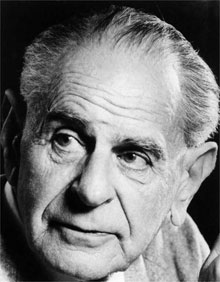
Popper
Karl Raimund Popper (28 Jul 1902 – 17 Sep 1994) is the creator of falsificationism as a philosophy of science. According to Popper, there is no such thing as inductive confirmation: theories can only be refuted. Whilst he allowed that theories that had withstood a wide variety of attempts to refute them were thereby ‘corroborated’, he denied that corroboration in this sense could justify belief. He therefore claimed to have solved the problem of induction, due to David Hume and others: there is no such problem because there is no induction.
Popper placed great weight on another problem in philosophy of science: that of distinguishing science from non-science, and especially from pseudoscience. Falsificationism was his answer to this problem too, as the relevant criterion is precisely that any genuinely scientific assertion must be capable of being falsified. For this reason, he maintained, only observation statements, and affirmative universally quantified statements, could properly be counted as scientific. Affirmative existential statements could never be falsified, because to do so would require potentially infinitely many observations.
Popper distinguished his demarcation principle – and the problem of demarcation – from that advocated by logical positivists, whether on the basis of the verification theory of meaning or on Carnap’s criterion of expressibility in a formal logical notation. He intended the latter to distinguish meaningful from meaningless use of language; of sense from nonsense, and in particular metaphysics. On the contrary Popper regarded metaphysics as an important contributor to scientific thought even if, because unfalsifiable, it was not part of it. Popper argued that certain philosophical problems were of immense importance: ‘[T]here is at least one philosophical problem in which all thinking men are interested. It is the problem of cosmology: the problem of understanding the world – including ourselves, and our knowledge, as part of the world. All science is cosmology, I believe, and for me the interest of philosophy, no less than of science, lies solely in the contributions which it has made to it’ (Preface, The Logic of Scientific Discovery, 1959).
Popper was born in Vienna, of Jewish decent, and in his early years attended the University of Vienna as a guest student. He eventually graduated from the University as a school teacher in 1924, returning to take a doctorate in psychology in 1928 under Karl Bühler. He attended many meetings of the Vienna Circle, whilst disagreeing with several of their core doctrines: he never considered himself a logical positivist. His most important work, already cited, was published in German in 1934, but made little impact. It was only when published in English translation in 1959 (with new extensive footnotes) that its influence spread. Following the Anschluss, in 1937 he moved to New Zealand, where he was appointed to the University of Christchurch. There he wrote one of the most influential works of 20th century liberalism, The Open Society and its Enemies. In 1946 he moved to England, taking up a position at the LSE, where he remained until his retirement in 1969.
Links
Stanford Encyclopedia of Philosophy >
Internet Encyclopedia of Philosophy: Karl Popper and critical rationalism >
Multimedia
Stephen Jay Gould: Sir Karl Popper’s ‘Science as Falsification’ >
